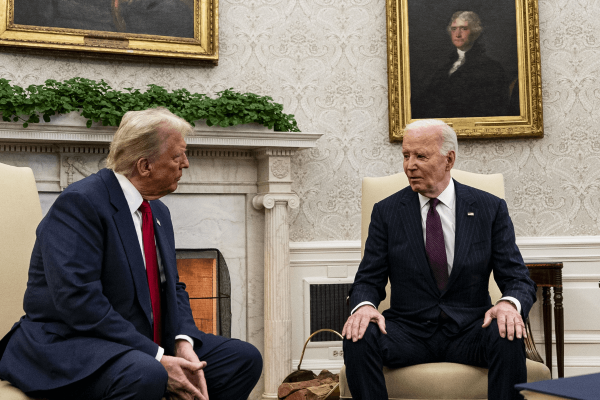Racism is a sin that has been biblically established. It was and is America’s original sin. Racism is notoriously both implicit and explicit, but covert and overt racism must be acknowledged and repented. When racism is made explicit and overt in the public arena, it must be named and called out for what it is — especially when the comments come from the president of the United States. Donald Trump’s tweeted and spoken racial assaults on four women of color, duly elected to the U.S. Congress, are a public sin that must be called out. Who will do that and who will not?
Trump’s tweets on Sunday and comments at the White House since, telling the four members of Congress — Rep. Alexandria Ocasio-Cortez, Rep. Ilhan Omar, Rep. Ayanna Pressley, and Rep. Rashida Tlaib — to go back to the countries they came from is painfully reminiscent of what people and families of color have been told from the moment they arrived in America by far too many white people — all of whom were also immigrants at some point or were white settlers who stole the lands of Indigenous Peoples and tried to wipe them away.
Such comments are always racist. They are offensive to our founding ideals, despite how badly those principles were flawed and inconsistent by race and gender in their application. But an attack on persons of color, all made in the image of God and deserving of equal dignity and respect as God’s children and as U.S. citizens, is offensive to God.
The real issues are not the congresswomen’s individual or collective political views nor their leadership styles, on which there are differing views even within the Democratic Party. The issue is their faces which are black and brown — the faces Donald Trump and many of his supporters don’t want to see in America’s politics. Who will stand up and speak out?
Standing up and speaking out is increasingly important given what we are clearly seeing. The racism of Donald Trump is not just a sin; it is a political strategy. From the beginning of the Trump presidency and even in his candidacy, some of us have pointed to Trump’s direct and deliberate plans to fuel racial fear and hatred for his own political gain. And that is clearly now his plan for re-election: a strategy based on stoking racism, xenophobia, and white nationalism. Who will call that out? Political leaders from both sides of the aisle, business leaders, especially faith leaders?
When you begin your political career with the racialized conspiracy of “birtherism” against the first black president; start your presidential campaign, right after coming down the escalator at Trump Tower, with the demonization of immigrants — exactly as all the would-be strongmen autocratic leaders around the world are doing; regularly attack Muslims, Mexican judges, black athletes, brown asylum seekers, labeling them as “criminals” ready to “invade” and “infest” America; and call many black and brown countries “s-hole” countries; you are deliberately creating a toxic mix of white nationalism, born in racism, and xenophobia, that even calls white and violent white nationalists “fine people.” From all that, it is perfectly natural and consistent to tell four brown and black congresswomen they should go back to where they came from.
While implicit racism has been in all American politics since the beginning and, quite honestly has been far too common in Republican politics for decades now since Nixon’s use of the “Southern Strategy,” Donald Trump has made this more and more explicit as the president of the United States. That this defies our nation’s founding ideals and the principles of Christian faith — however hypocritical their practice has always been — has so far not been enough for Trump’s political and religious supporters to call out his racism. Will this week’s words from the occupant of the White House denounced by many across political boundaries as “blatant racism” or “flat-out racism” cause his Republican party and his evangelical religious chaplains to call out Trump’s racism? We will see.
So far, both the Republican leaders of the House and Senate have refused to criticize their leader’s comments and have emphatically proclaimed that “The president is not a racist.” Racists rarely ever admit to being one. Only four Republicans, including Will Hurd, the only African-American Republican in Congress, another retiring member of Congress, and two others in trouble in swing states voted to sign the congressional resolution against the president’s “racist” tweets and pronouncements. Painfully, for many principled conservatives and historic Republicans, these issues are now breaking down literally across party lines. Support for racism is becoming a partisan issue.
The data is frightening.
New polling released this week paints a grim picture. While 68 percent of respondents saw Trump’s tweets as offensive, there’s an alarming partisan divide: 93 percent of Democrats and 68 percent of independents found the tweet offensive, but only 37 percent of Republicans did. A majority (57 percent) of Republicans said they agreed with Trump’s tweets, compared to 7 percent of Democrats.
When FOX News reporter John Roberts asked Trump on Monday if it concerns him that “many people saw that tweet as racist and that white nationalist groups are finding common cause with you on that point?” Trump’s response was, “It doesn’t concern me because many people agree with me.” Who does and who doesn’t agree on these vital matters of racism and America’s future is what puts the soul of the nation now at stake.
The moral duty to name and reject racism cannot only fall on the shoulders of people of color, those who are being targeted and assaulted; it must also include other white people in this nation. The four congresswomen have already forcefully responded to Trump’s assault on them (which puts a target on their backs and threatens them with violence), the entire Congressional Black Caucus has spoken out, and countless religious leaders of color have spoken out.
If we hear silence from white people of faith, we are in deep spiritual trouble. Christian moral objection to the president’s racist language must grow every day and from many quarters, but so far, no word at all from the president’s most prominent evangelical supporters. Those Trump supporters have other issues and moral concerns, including differences with Democrats on abortion (as others of us do too); but will they call out the President on racism? That has now become an urgent moral and theological test.
I have decided to reach out to five of those Trump evangelical advisors, supporters, and sometimes surrogates, with whom I have had some personal contact— and I request that all of you do the same.
First is Robert Jeffress, pastor of the First Baptist Church in Dallas, whom I recently met on a radio show where we were interviewed together. At a few points, Rev. Jeffress told the NPR audience that he agreed with me about how crucial a multiracial church was to America going forward. So I have contacted him to ask if he will call out these racist tweets and comments from Donald Trump. You could ask him too; his Twitter handle is @robertjeffress.
Ralph Reed, who leads the Faith and Freedom Coalition, and I have had a few meals and conversations together. He feels strongly about other moral issues which we have also discussed, but I have now asked Ralph whether he will call out these presidential racist comments. You can too at @ralphreed.
I have seldom met Franklin Graham, whose father Billy Graham and I were long-time friends, but Graham spoke out, as I did, about how wrong it was to separate migrant children from their parents on the southern border. So, I have just reached out to him to ask if he will now openly challenge the president’s racist language. You can too at @Franklin_Graham.
Samuel Rodriguez is an old friend who,as a Hispanic pastor and Christian leader , of course, cares about immigration issues. I just e-mailed Sam to ask him if he would speak out against this racist rhetoric from Donald Trump who regularly uses that same poisonous language to attack immigrants. You can too at @nhclc.
I don’t know Paula White-Cain, who is the senior pastor and evangelist of New Destiny Christian Center in Orlando, Fla., as well as an author and TV personality, but have spoken with some other megachurch pastors who are close to her. So I have e-mailed her too, referencing our mutual contacts, asking her to speak out to fellow Christian leaders against the president’s racist comments. You can reach her at @Paula_White.
You can also ask your local pastor whether he or she will speak out clearly against the racist tweets and comments by the president, no matter how their congregants feel on other political issues. Ask the same questions of your congregational members or your friends or even your family, risking difficult dinner table conversations.
This upcoming presidential election is becoming a referendum on racism and xenophobia. Which means the central national question, and I believe the Christian question, will be who will call out the racism — for the sake of our country’s best founding ideals, for the sake of the gospel and our Christian witness in the world, and for the sake of the soul of this nation.
Trump’s top aides say that he is not really working to bring in more people from the moderate or independent voting constituencies, but rather intends to reach out even more to his white base — and seek to expand it. Therefore racism, and a literal and direct appeal to white nationalism, is Trump’s political strategy. Donald Trump is running on racism. And that must become the fundamental moral challenge to anyone who calls themselves a Christian, not matter what their views on other policy questions.
As pointed out on Morning Joe this morning, U.S. Equal Employment Opportunity Commission On Anti-Discrimination Laws says this: “Examples of potentially unlawful conduct include insults, taunts, or ethnic epithets, such as making fun of a person’s foreign accent or comments like ‘Go back to where you came from,’ whether made by supervisors or co-workers.” That means Donald Trump’s tweets and speeches and his white base’s supportive chants are not only racist and wrong; they are illegal. Joe Scarborough, who habitually calls himself still a “conservative,” and has all this week, said today that this is “the law of the land” which is being violated by Donald Trump.
Just last night, these issues came up in one of the most frightening ways we have so far seen in the Trump presidency, when his crowd at a North Carolina political rally began to chant “send her back!” in response to Trump’s attacks on Rep. IIhan Omar, one of the four congresswomen of color.
What Donald Trump did last night in lying about and demonizing Rep. Omar, who is indeed an immigrant to America, then stepping back from the podium and encouraging his angry supporters to chant “send her back” is un-American, it is illegal, it is a sin against God, and it is anti-Christ—antithetical to the teachings of Jesus—and must be called out by any American who calls themselves a Christian.
There is one thing from Donald Trumps’ tweets I agree with. It was when he said, “[see] you at the ballot box!” He’s right. And that asks all of us where the moral courage will come from among faith leaders, business leaders, and political leaders across the political spectrum before the ballots are cast in 2020. What will Christians say and do and how will they vote? Silence in the face of public evil is a fundamentally moral issue — and is a matter of faith.
Got something to say about what you're reading? We value your feedback!







